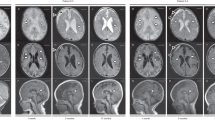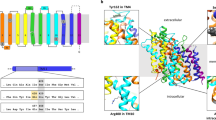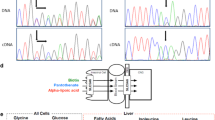Abstract
Biotlnidase deficiency is an autosomal recessive inherited disorder that is characterized by neurological and cutaneous symptoms1–3. Biotinidase-deficient children cannot recycle endogenous biotin, an essential water-soluble B vitamin. Biotin is covalently attached to ɛ-amino groups of lysyl residues of four carboxylases. These carboxylases are subsequently degraded to biocytin (biotin-ɛ-lysine)4,5. Biotinidase cleaves biocytin to biotin and lysine, thereby completing the biotin cycle5,6. The symptoms of biotinidase deficiency can be resolved or prevented by treatment with biotin5. Therefore, it is important that biotinidase deficiency is diagnosed early so that permanent neurological damage can be prevented. Many states and countries currently perform newborn screening for biotinidase deficiency7. We have recently isolated and characterized the cDNA for normal human biotinidase8 and localized the gene to chromosome 3p25 (ref. 9). We have now identified the first mutation that causes profound biotinidase deficiency. It occurs in a distinct region of the gene that encodes the putative signal peptide. Fifty percent of symptomatic children studied have a 7-bp deletion coupled with a 3-bp insertion in at least one of their alleles of the biotinidase gene. This mutation appears to be a common cause of biotinidase deficiency in symptomatic children.
This is a preview of subscription content, access via your institution
Access options
Subscribe to this journal
Receive 12 print issues and online access
$209.00 per year
only $17.42 per issue
Buy this article
- Purchase on Springer Link
- Instant access to full article PDF
Prices may be subject to local taxes which are calculated during checkout
Similar content being viewed by others
References
Wolf, B., Grier, R.E., Allen, R.J., Goodman, S.I. & Kien, C.L. Biotinidase deficiency: The enzymatic defect in late-onset multiple carboxylase deficiency. Clin. Chim. Acta. 131, 273–281 (1983).
Wolf, B. et al. Phenotypic variation in biotinidase deficiency. J. Pediat. 103, 233–237 (1983).
Wolf, B. et al. Biotinidase deficiency: initial clinical features and rapid diagnosis. Ann. Neurol. 18, 614–617 (1985).
Wolf, B. & Feldman, G.L. The biotin-dependent carboxylase deficiencies. Am. J. hum. Genet. 34, 699–716 (1982).
Wolf, B. in The Metabolic and Molecular Bases of Inherited Disease (eds Scriver, C.R., Beaudet, A.L., Sly, W.S. & Valle, D.) 7, 3151–3180 (McGraw-Hill, Inc., New York, 1995).
Pispa, J. Animal biotinidase. Ann. Med. Exp. Biol. Fenn. 43 (Suppl. 5), 1–39 (1965).
Wolf, B. Worldwide survey of neonatal screening for biotinidase deficiency. J. Inherited metab. Dis. 14, 923–927 (1991).
Cole, H. et al. Human serum biotinidase: cDNA cloning, sequence and characterization. J. biol. Chem. 269, 6566–6579 (1994).
Cole, H., Weremowicz, H., Morton, C.C. & Wolf, B. Localization of serum biotinidase (BTD) to human chromosome 3 in band p25. Genomics 22, 662–663 (1994).
Hart, P.S., Hymes, J. & Wolf, B. Biochemical and immunological characterization of serum biotinidase in profound biotinidase deficiency. Am. J. hum. Genet. 50, 126–136 (1992).
Tahara, T., Kraus, J.P. & Rosenberg, L.E. An unusual insertion/deletion in the gene encoding the beta-subunit of propionyl-CoA carboxylase is a frequent mutation in Caucasian propionic acidemia. Proc. natn. Acad. Sci. U.S.A. 87, 1372–1376 (1990).
Moskowitz, S.M., Tieu, P.T. & Neufeld, E.F. A deletion/insertion mutation in the IUDA gene in a Libyan Jewish patient with Hurler syndrome (mucopolysaccharidosis 1H). Hum. Mut. 2, 71–73 (1993).
Hart, P.S., Barnstein, B.O., McVoy, J.R., Matalon, R. & Wolf, B. Comparison of profound biotinidase deficiency in children ascertained clinically and by newborn screening using a simple method of accurately determining residual biotinidase activity. Biochem. Med. Metab. Biol. 48, 41–45 (1992).
Neitzel, H. A routine method for the establishment of permanent growing lymphoblastoid cell lines. Hum. Genet. 73, 320–326 (1986).
Saiki, R.K. et al. Enzymatic amplification of beta-globin genomic sequences and restriction site analysis diagnosis for sickle cell anemia. Science 230, 1350–1354 (1985).
Mutter, G.L. & Pomponio, R.J. Molecular diagnosis of sex chromosome aneuploidy using quantitative PCR. Nucl. Acids. Res. 19, 4203–4207 (1991).
Orita, M., Suzuki, Y., Sekiya, T. & Hayashi, K. Rapid and sensitive detection of point mutations and DNA polymorphisms using the polymerase chain reaction. Genomics 5, 874–879 (1989).
Orita, M., Iwahana, H., Kanazawa, H. & Hayashi, K. Detection of polymorphisms of human DNA by gel electrophoresis as single-stranded conformation polymorphisms. Proc. natn. Acad. Sci. U.S.A. 86, 2766–2770 (1989).
Handelin, B. & Shuber, A.P. in Current Protocols in Human Genetics (eds Dracapoli, N.C. et al.) 4.1–4.8 (John Wiley and Sons, Inc., New York, 1994).
Author information
Authors and Affiliations
Rights and permissions
About this article
Cite this article
Pomponio, R., Reynolds, T., Cole, H. et al. Mutational hotspot in the human biotinidase gene causes profound biotinidase deficiency. Nat Genet 11, 96–98 (1995). https://doi.org/10.1038/ng0995-96
Received:
Accepted:
Issue Date:
DOI: https://doi.org/10.1038/ng0995-96
This article is cited by
-
The Classification of Autosomal Recessive Cerebellar Ataxias: a Consensus Statement from the Society for Research on the Cerebellum and Ataxias Task Force
The Cerebellum (2019)
-
Clinical utility gene card for: Biotinidase deficiency—update 2015
European Journal of Human Genetics (2016)
-
Biotin starvation causes mitochondrial protein hyperacetylation and partial rescue by the SIRT3-like deacetylase Hst4p
Nature Communications (2015)
-
Biotinidase deficiency: clinical and genetic studies of 38 Brazilian patients
BMC Medical Genetics (2014)
-
Clinical utility gene card for: Biotinidase deficiency
European Journal of Human Genetics (2012)



